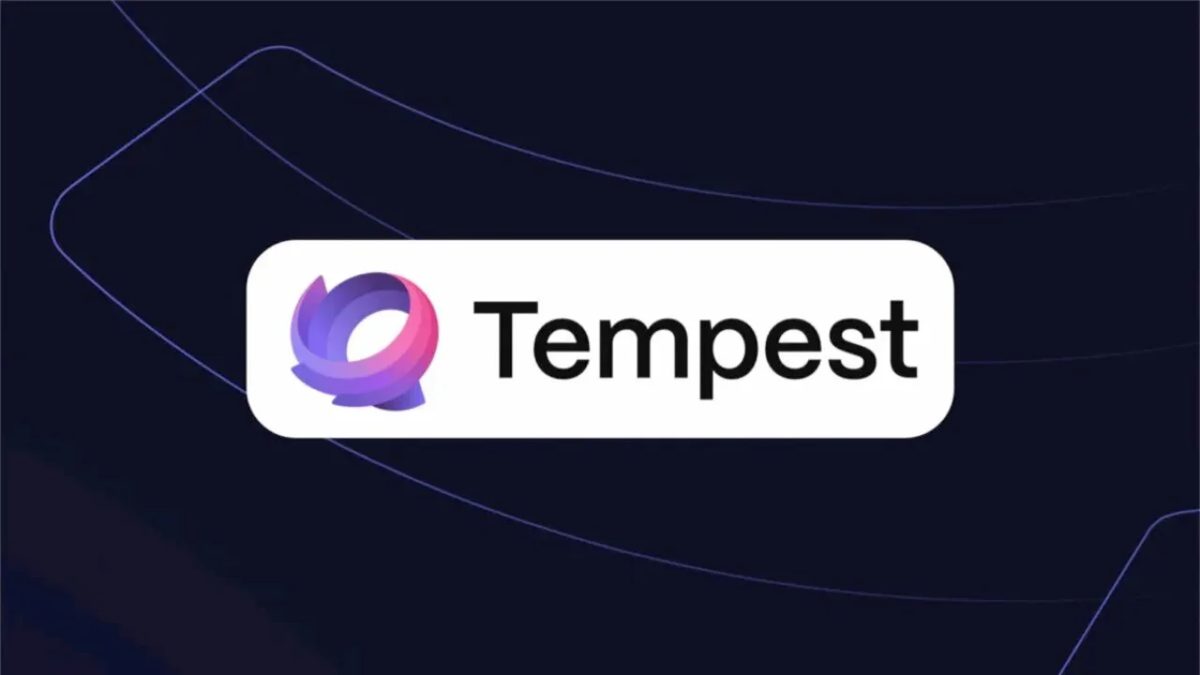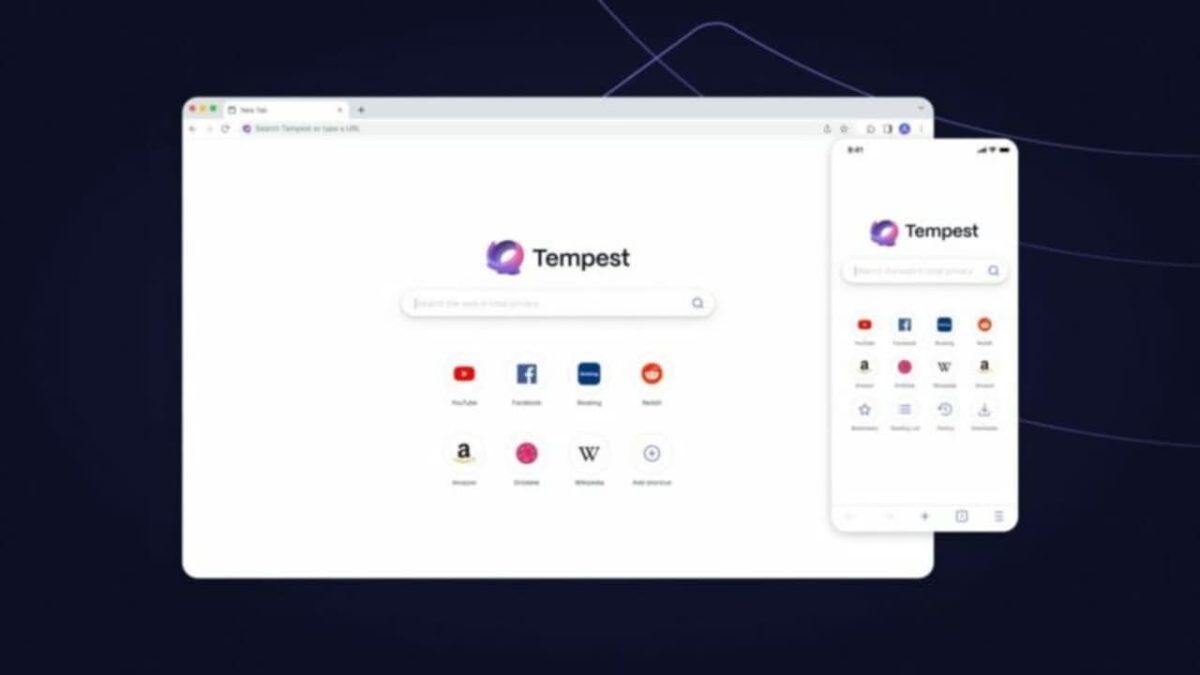Meet Tempest, a new search engine that doesn't sell your data

The landscape of the internet has transformed dramatically in recent years, with our search engines and browsers serving as the gateways to the hyper-connected world we inhabit. However, this also raises concerns about privacy, the veracity of information, and the dangers of digital bubbles.
If you have similar concerns, try Tempest, a company dedicated to safeguarding online privacy. They have recently launched a new venture featuring their new search engine and browser, with the aim of placing control over privacy back in the hands of users. This initiative is particularly timely, given the increasing prevalence of AI tools and the concerns around how tech companies collect and use our data.
With Tempest, you can surf and search in style
Founded in 2019 by entrepreneurs Michael Levit and Sean Murphy, Tempest is a leading online privacy company operating in ten countries across three continents. Their new search engine and browser serve as innovative solutions for those who value their privacy and security online.

Tempest Search, the privacy-focused search engine, aims to eliminate search engine tracking, browser history, and ad retargeting.
Tempest also promises to end digital echo chambers and deliver unbiased results. Additionally, Tempest is committed to halting data profiteering by refraining from monitoring or selling user data to third parties.
Another unique feature of Tempest is the Privacy Report, which provides a comprehensive analysis of how websites treat our privacy, allowing users to make informed decisions about their online activities.

Tempest's emphasis on user privacy comes at a time when major tech companies have come under scrutiny for their data collection and sharing practices. With Tempest, users can avoid personalized ads based on search history, and each search can produce unbiased results. This is a crucial step forward in combating the manipulative algorithms that can reinforce digital bubbles and limit access to diverse perspectives.
Furthermore, Tempest's no-tracking policy means that each search is new and unbiased, allowing for a range of perspectives and even opposing viewpoints on the same topic. This is a valuable asset in the current climate, where disinformation and propaganda can have far-reaching consequences.
Last but not least, Tempest's dedication to privacy does not reduce business success. As the era of profiting from data collection, they have proven that it is possible to do so without sacrificing users' privacy and are placing their bets on this strategy.

In conclusion, Tempest's new search engine and browser represent an exciting and necessary development in the world of online privacy. By providing users with control over their data and promoting unbiased, diverse perspectives, Tempest is helping to safeguard the future of the internet.
Do you want to surf the Internet safely? If so, click here and take back your online privacy.
Advertisement



















It’s one of those numerous pseudo-private commercial search engines that are mainly proxies to Google Search or Microsoft Bing Search (here, Bing) and pretend not to profit from personal data while in fact still profiting from sensitive private data (search terms) through advertising, just a little bit less violently than for instance Google by not building a profile, although in that case this is not even clear from the rather vague privacy policy compared to the well known equivalents like DDG.
A striking defect in their own description (and in this ghacks article as well) is that there is no mention of how they make money, of ads, and that they are a Bing proxy. That last point is mentioned in the privacy policy only (Microsoft corporation is a subprocessor for the provision of search results), the others points I have seen nowhere on their site. Usually well known pseudo-private search engines (typically SP and DDG) are more transparent about this.
The privacy policy states that “the information we process for user queries are hashed IP address and approximate geolocation”. It does not specify however how it is processed and for what purposes. The problem being that an hashed IP address is not necessarily a correct anonymization process. Take this example of companies specialized in reversing hashed email addresses here, that can hash all five billion existing email adresses in about ten milliseconds for less than a hundredth of a cent:
https://freedom-to-tinker.com/2018/04/09/four-cents-to-deanonymize-companies-reverse-hashed-email-addresses/
For comparison, there are about 4 billion IPv4 addresses. So it’s not even obvious that there is proper anonymization, and because the company considers this anonymous data anyway, it doesn’t even feel necessary to state in the privacy policy what it’s used for. But taking the example of another pseudo-private Bing proxy, Ecosia, they actually send to Bing this hashed IP address together with the query ; in fact they may do better than Tempest by removing half of an IPv4 IP address before hashing and sending it but their wording is ambiguous too about it, maybe not even. So it’s possible that Tempest is basically just sending to Bing the query with your personal identity.
The service proudly says that “since Tempest is committed to respecting your privacy, by default, cookies are not used or set in your browser” but will only show a blank page is cookies are disabled, which is not quite smart.
About the discussion in the comments here about using local storage vs cookies, I mainly disagree with Tom Hawacks. For that purpose local storage is mainly a more modern version of cookies with more storage, not being needlessly sent with every query and so on. I suspect that most of the users who clean, use the built-in browser tools for that, that do not distinguish cookies from local storage, so both would be cleaned together. Those who use cleaning extensions are probably a minority of those who clean, who are already a small minority of the users. And those cleaning extension users might use cleaning extensions that clean only cookies, but might as well use extensions that clean both… I disagree that anything malicious or not serious should be seen in using local storage instead of cookies (except in special situations that are not relevant here and in general) and I doubt that Qwant changed this for that reason, or if it was the stated reason, it was only demagogy.
About the claim from ghacks that Tempest promises to end digital echo chambers and deliver unbiased results, it’s a priori automatic for all pseudo-private engines since they don’t build a profile to personalize results across searches. However it does not mean in theory, and in practice too, that the engine will not alter results ordering or censor results according to criteria that are nefarious to the users, although not personalized. Other more known pseudo-private search engines like DDG had made the promise of unbiased results and later indulged in war censorship for their government, going as far as presenting this as a proof of their commitment to unbiased search results. The worst part is that I did not find a trace of this decision on DDG site, as it was only announced on Gabriel Weinberg’s twitter account (DDG’s CEO), tweet which can’t even be found today because this person apparently decided that his “tweets auto-delete after a while”:
https://twitter.com/yegg/status/1501716484761997318
There is no reason to trust equivalent pseudo-private meta search engines to be more transparent and honest on that point. And furthermore, these being mainly or only search proxies (meta search engines), they also inherit the bias and censorship from the source engines, typically Google and Microsoft ones…
The solution for search privacy is to use an actually private engine, for example a SearX instance (meta-search engine), which contrary to Tempest will not monetize sensitive private data for advertisers because it’s user respecting by design, not just another surveillance capitalism service.
When it comes to anonymous browsers, there are many options available, but Utopia P2P browser’s web proxy function stands out from the rest. It’s fast, reliable, and free, making it the ideal solution for anyone who wants to browse the web safely and access any blocked website.
I went back to the Searx engine. I have an extension called “New Tab Homepage” which opens new tabs to whatever I setup my homepage to be. The Tempest extension hijacked the homepage and started plugging it with whatever I searched last for. I use Privazeer to completely wash Firefox and the Edge browser of history and cookies. So after washing these browsers with Privazeer and then opening my browser, I do not want to be greeted with my search history. The Tempest extension Is like a cookie that remembers your history and cannot be deleted. At least searx is an open sourced search engine that does a decent job at respecting my privacy.
Privazeer is like a complete enema for your computer. You are probably researched by the FBI to use that ?
i don’t like the requirement to create an account to sync settings with an unknown entity. i am using firefox for my main browser on all platforms so i DO have an account there, but i trust FF. i use brave and duckduckgo occasionally and checked out orion and liked it, but how many 3rd party browsers does the world really need?
Searx for now is most likely the best option for a search engine.
I like Searx a lot. The only thing that turns me off from it is that in order to setup the settings, cookies have to be enabled.I delete all of my cookies for privacy and I like to have a dark theme also. StartPage had a feature where a user could copy and paste the URL settings into the homepage of Firefox without having the need for cookies. Too bad StartPage was sold to an ad company.
I made Tempest my home page in Firefox and also installed the extension. I got rid of Startpage a couple of months ago when they started baking ads into the search results that even Adguard couldn’t block. I was using SearchNGX but now I will give this a try. I’m not sure if I should be concerned about the company being in the USA or not seeing that the USA is one of the five eyes. Nevertheless, I’ll give Tempest a shot and see if I like their product.
Should we just blindly believe you on the basis of your blue eyes and swallow everything like candy without any scientific proof?
This is just an Amazon search engine, and Amazon we know mainly for its particularly egregiously bad human resources policies and shareholder greed.
One more thing Amazon sells all your data to anyone willing to pay for it.
So there’s really no getting around the fact that this actually looks like a poorly disguised ad.
Changed to tempest by setting the search string to Firefox (android) results of doing this were:
1 slowing of search results
2 firefox slows down dramatically switching tabs, scrolling,
3 firefox stops responding and crashes after about 15 minutes
4 settings for tempest are not local, and need to be reset each time you open browser. Its not based on cookies.
5 serch results exaclty the same a as duck duck go
6 cannot find very much about the company on the web site —- no address or company listing only that they are us based —- not sure what or why they are hiding
I found that the company is based in Ireland with a second base in San Francisco
The CEO and at least one other used to work for CBS Interactive.
lol, yeah right. Nothing about a Search engine is private. They are FREE for a reason. To make money by tracking users. If they don’t track, you it won’t be able to give you the right results. That’s how all Search engines work. They all do tracking.
This reads like an Ad, not like an informative Article
A very interesting search engine and also browser. Thanks for this good article! :]
Is tempest using their own search DB? I doubt it. So, they are getting results from external sites, which means its biased, censored and unreliable.
Sounds like a load of hype so far.
Thanks, Tom – your comments are always useful and appreciated. As soon as you said they use localStorage that raised a flag for me. Most users don’t understand it and it was shoe-horned in by Adobe for their own nefarious purposes.
Looks like a DDG reskin. By default it sends “anonymous” statistics. No thanks.
thanks. seems pretty good so far. found things where bing and google couldnt.
Yeah, this reads like an ad and there’s basically nothing anywhere supporting the legitimacy or credibility of this.
Tempest [https://www.tempest.com/] doesn’t start with cookies blocked, which is never IMO a good sign. Blocking cookies should only prevent the user from setting/keeping the site’s options, not prevent the site from opening.
Tempest Homepage has nothing blocked by uBO : good.
Tempest Results’ pages :
Advertisement within the results and within the right sidebar, clearly notified as such. Easily removable with a CSS
Connects to [cdn.apple-mapkit.com] which should occur only when searching ‘Maps’
Not exaggeratedly excited.
what about browser?
is more like brave o like chromium?
Brave is Chromium
@assurbani, I haven’t tested the Tempest browser. I don’t install heavy and/or important applications without substantial information/documentation. I have no idea what Tempest browser is, and from what i tested with Tempest’s search engine I have no intention of testing its browser.
Tempest search engine uses extensively XMLHttpRequest (XHR) which is pertinent on pages which technically need continuous data return from the user’s actions, not on a site such as a search engine.
Tempest, on search results pages, connects extensively to most if not all the sites included within the results : not necessary at all, to put it mildly.
Tempest stores the user’s preferences in the user’s localStorage, WHICH IS NOT the right place to store user preferences which should always be located within cookies. Some sites do that because they know that more users clean their cookies than their localStorage/IndexedDB. Qwant used to do it but have ceased doing it for some time now. This is not a serious site behavior.
To summarize ; from what I’ve experienced Tempest Search Engine is just a user data provider for Amazon. If I had to score it it’d be 2/10. The site behaves as a “wise guy”. From there on how could I possibly be tempted to try their browser? Ain’t got the faintest idea.
“Tempest stores the user’s preferences in the user’s localStorage, WHICH IS NOT the right place to store user preferences which should always be located within cookies. Some sites do that because they know that more users clean their cookies than their localStorage/IndexedDB”
Why is it not the right place ? I mean, what’s the negative point ?
Cookies are sent with the HTTP header, and it’s mainly used for server-side
Here the users preferences are client-side, so what’s the issue to put them in the local storage ?
Do you spent your time to clear your cookies ? When I removed my cookies it’s mainly to logout from all the websites I’m connected.
It will be great if you can provide a deeper technical explanations.
where is the user’s localStorage?
Just do “chrome localstorage location” search to find its location.
tried to download from their website, but, unable to try as it seems there is no linux support for their browser
:-(
They are using Bing ads. Not sure how it relates to privacy.
They are using Bing as a sub-processor. The keyword you type, will show the related Bings Ads (like Google Adsense), so there is no data or queries kept on Tempest.
Microsoft may retains this anonymized data (according to their privacy policy), but it’s not tracked by Tempest.